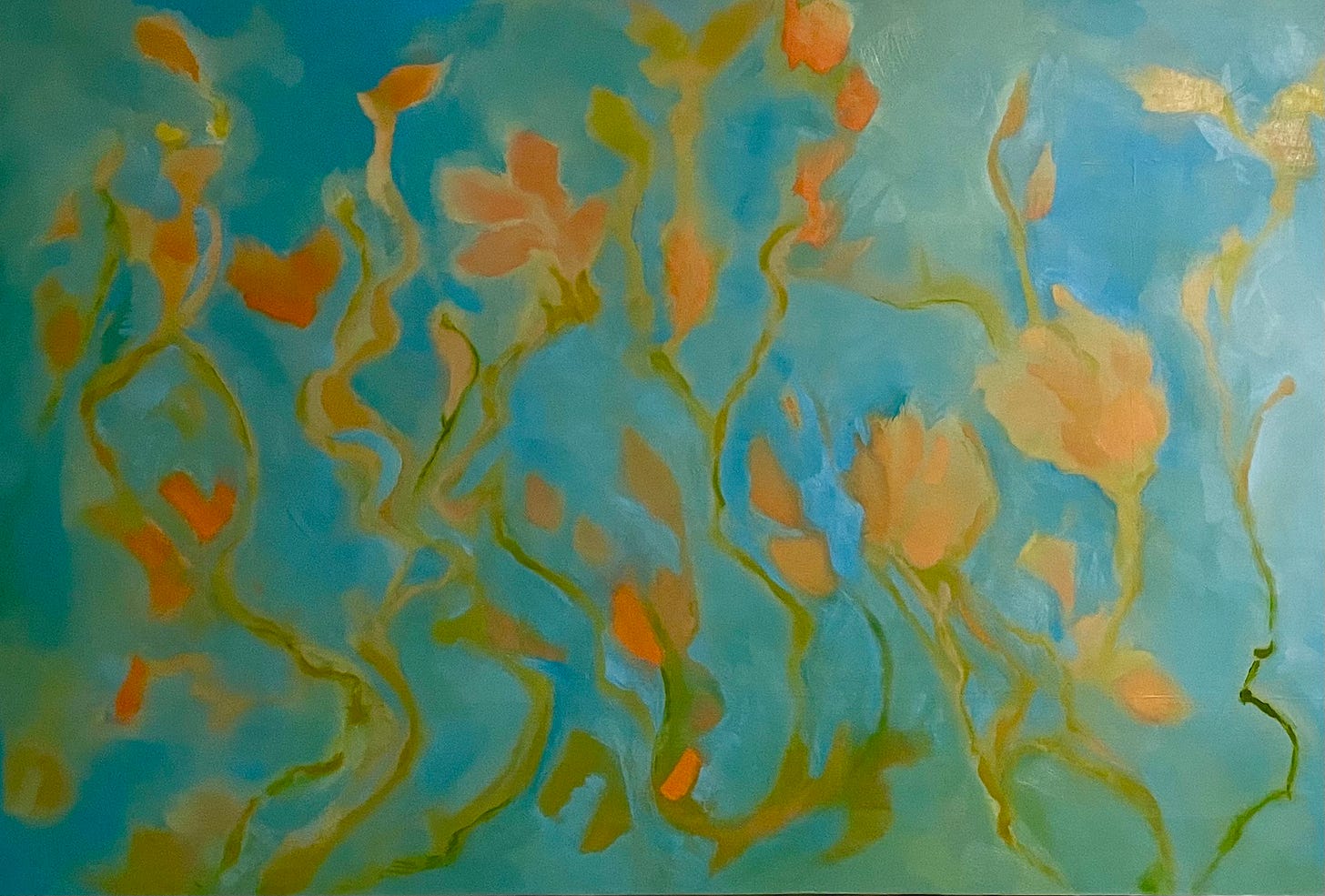My space supports me. When I am tired, the space that I have created holds me up. When I need to have quiet, and to escape the silent, or not so silent pressures of other consciousnesses, my space has helped me unravel the many threads that clutter my clarity. Like other introverts, my source, in the end, is silence-a space from which to explore the myriad reflections that flood me. In the privacy of a solitary space, I disentangle myself from webs, both inner and outer, until I find that still, steady horizon of truth. I know I am very fortunate to have this opportunity, and I am grateful.
As a therapist, I “hold space” for others. I am not sure when I first started hearing this term, hold space, perhaps a good decade ago, but I find it very apt. When you listen, you are holding space. If I were to describe my feelings when I do so, it would be something like this: I am sending, to the best of my ability, emanations of warmth and acceptance. I am trying to help the person before me be unencumbered by fear. I want him or her to face the thoughts that rise up within him without censure. (And yes, we do censure our own thoughts.) It takes effort to face them. When you do turn to face your thoughts, miraculously, your dilemmas and contradictions, feelings and longings, are laid bare before you like a gift. Finally, finally, you have the chance to see them clearly.
Very commonly, when I paint, I am painting conversation. The “spaces” I have held come back to me like so many flowers, dark or light, stretching toward the sun; desirous, as if they were entities, to appear to me and be discovered.
Recently I have been reflecting on what it feels like to me when others visit my studio. Of course I clean it up first; making the glass table top that is my palette completely shiny and streak free-using a razor blade to remove hardened bits of oil paint or medium. I put the less successful paintings out of sight, because even though I am still learning from them, I need to think of how I am presenting my work. I gather paintings into groupings, and sweep bits of wood away from the floor under my cast iron stove. The chairs in the sitting area are straightened, and the remnants of framing: eye hooks, my beloved Makita drill, strips of tracing paper used to prevent glue from sticking to my cherry counter- all are put away. It’s quite nice, when clean, but its not really what it usually looks like.
When people visit my studio, I feel a curious kind of quandary. They are looking at my work, which I want them to do, but they come with so many different agendas. Sometimes my feeling is that they are tourists. Borrowing with their eyes bits of my life as a stimulation or amusement. At other times, the interest is deeper. They follow my journey and detect, sometimes very perceptively, places that I have been. I may sense a companion of sorts; another traveller on life’s el camino. My quandary might better described as an ambivalence. I both want to share the space where I create, and hide my private world to reserve it just for myself. Do they see that this is my temple? My skylights let in light, my brushes the colors of worship?
The part of open studios that I find most distasteful is the selling aspect. Selling a painting feels more like finding a home for a puppy, or adopting out a bit of my wandering soul. I am no merchant seeking income-rather I want to speak with you through imagery, and if you find something there, we can honor one another. Money is just the signifier of understanding-enough that a value is indicated, but not so much that the buyer is being used.
One of my favorite mystics is Meister Eckhart. Born in 1260, Eckhart was a Christian whose lectures paralleled the mystery and paradox of Buddhism. It is his work that speaks to me most strongly about the central question that inspired my substack. How does the experience of the muse relate to spiritual inspiration? Or, put another way, what is the ah ha moment, and where does it come from?
Let me share a rather lengthy quote from Eckhart. See if it speaks to you as it does to me. (It can be found in Meister Eckhart, a modern translation by Raymond B. Blakney.) Notice, for those of you who meditate, how Eckhart’s questions resemble those encountered in meditation.
If a person withdraws into himself, with all his powers, mental and physical (i.e. agents of his soul), he comes at last to a condition in which he has no ideas and no limitations and in which he exists without activity of inner or outer life.
He should observe, then, whether or not he is moved to come back to life, but if he finds that he has no urge to get back to work or responsible activity, then he should break loose and get to work of some kind, mental or physical. For a man should never be content (with such indulgence) however good it may be or seem to be, which really does violence to his nature, and of which it could be said that he is doing no work, but is merely worked upon , for we must learn to co-operate with God.
Not that one should give up, neglect or forget his inner life for a moment, but he must learn to work in it, with it and out of it, so that the unity of his soul may break out into his activities and his activities shall lead him back to that unity. In this way one is taught to work as a free man should (dispassionately). Keep your eye on the functioning of your inner life and start from there…If, however, the outward life interferes with the inner, then follow the inner; but if the two can go on together, that is best of all…
The reason I like this quote is that it describes a simultaneity of action and deep self awareness. This, to my mind, is the goal of spiritual practice-in fact it is spiritual practice; the alignment of inner and outer, of self and other.
It occurs to me that I should use his teaching to guide my response to others in my studio space. Can I bring together inner and outer realities in my private space when others join me there? What do I resist when I resist the presence of others. What do I resist when I seek the presence of others? How can each state be met with an equal calm?
Thank you for your support for my work. Namaste,
Leslie






“Not that one should give up, neglect or forget his inner life for a moment, but he must learn to work in it, with it and out of it, so that the unity of his soul may break out into his activities and his activities shall lead him back to that unity.”
I’ve always mentally separated the two, so thank you for sharing this quote. I know I’m in touch with my soul when I work but never considered the possibility of unity.